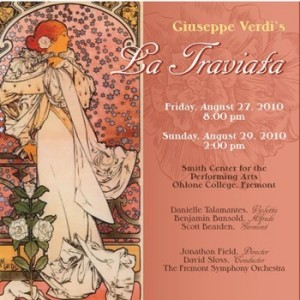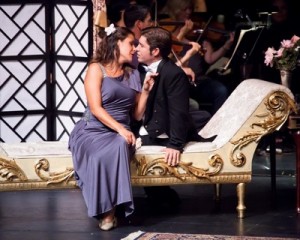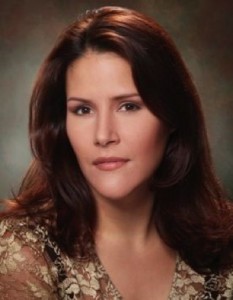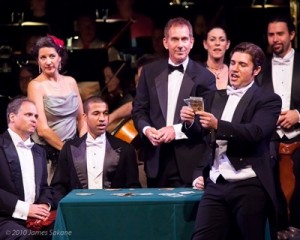In May I saw West Bay Opera’s production of Verdi’s operatic version of Dumas’ play Lady of the Camellias three times, and in June I went twice to the Pocket Opera version.
Last night I attended my sixth performance of La Traviata this summer, this one by the Fremont Opera.  And every time there were tears in my eyes as the orchestra played the final notes of Act III.
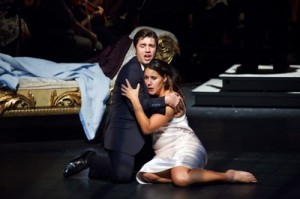
The finale wasn’t magic this time, but it was damned good. When Artistic Director of the Fremont Opera and Conductor of the full-sized Fremont Symphony Orchestra David Sloss finally lowered his hands and the lights dimmed, the audience burst into enthusiastic applause.¬† The applause continued as the stage cleared, the lights came back on, and the well-rehearsed chorus filed on to take a bow.¬† They were followed by the minor characters including “®Sonia Gariaeff as Flora, Brian Thorsett as Gastone, “®Igor Vieira as Baron Douphol”®, Adam Meza as Marquis d’Obigny, “®David Wright as Doctor Grenvil”®, and Shira Renee Thomas as Violetta’s maid Annina.¬† The applause revved up a notch for the two Germonts, father “®Scott Bearden and son (Alfredo) “®Benjamin Bunsold.¬† And when Danielle Talamantes finally appeared the audience rose as one to greet her portrayal of Violetta in standing applause.¬†¬† And we stayed there applauding for conductor David Sloss, director “®Jonathon Field, and chorus master, James Frieman.¬† It was a great performance!
David Sloss has been a musical presence in the Bay Area for more than 30 years.¬† He has been Music Director and Conductor of the Fremont Symphony since 1980 and was Artistic Director of West Bay Opera for ten years starting in 1997.¬† In 2007 he left West Bay to form his own opera company in cooperation with his well-established orchestra.¬† He took with him his uncanny ability to find and attract excellent singers, both locally and from all over the country.¬† Sloss refers to his operas as “semi-staged”.¬† In this case the term is literally true, in that the opera cast has only the front half of the stage to work in – the back half being fully occupied by the full sized symphony orchestra.¬† Thus there was no “scenery” for the opera – but I didn’t miss it in the least.¬† Musically, it makes a lot of sense to have the orchestra behind the singers rather than in a pit in front of them.¬† After all, when you go to a symphony concert the soloist, vocal or instrumental is always at the front of the stage, between the orchestra and audience.
The performance got off to a great start. There was no curtain, and when we entered the theatre the orchestra was already seated and warming up.  We could see that the front of the stage was sparsely furnished with a sort of settee and a couple of small tables.  Only a couple of minutes after the posted starting time of 8:00 PM, the orchestra did their final tuneup and the lights dimmed to near zero.  When they came up a few seconds later David Sloss was on the podium, Violetta was lying under a blanket on the settee, and Amina was unobtrusively in the background.  As the orchestra was playing the overture, Ms Talamantes was demonstrating her acting skills without opening her mouth except for a near-silent cough now and then.  By her facial expression and body language she told us that she was a sick woman, that she was so-o-o tired, that doing anything was difficult and probably not worth the effort, and that life was probably not worth living.
The overture finishes and blends into the opening music of Act I.¬† Her party guests are arriving!¬† In an instant she rises to the occasion and puts on her party face.¬† She is all smiles and laughter, flitting from one guest to another with flirtatious looks and suggestive body language.¬† She had already won our hearts – and then she started to sing – and we might just as well end my review right here and jump ahead to the standing ovation mentioned above.¬† If you were there, you don’t need my words; if you were not there, my words would be wholly inadequate.
We are going to hear more about young Ms Talamantes.¬† (I say “young” because she received her Bachelor’s degree (cum laude) in 1998 and sang her first role (Yum-Yum) only 7 years ago.¬† According to the program notes, she will be a cover for several roles at the New York Met this coming season.¬† I certainly don’t want to wish bad luck on any of the Met stars, but let me put it this way: IF she is covering one of the roles in an opera on the Met HD schedule, and IF the singer she is covering should, at the last minute, be unable to go on for a scheduled performance, THEN I hope that the performance in question is the one on Met HD.
Of course there are other important roles in the opera.¬† If you’ve read my reviews of the other productions, you know that I began this summer secure in my belief that Germont pŤre was second only to Pinkerton as a “white-collar” villain.¬† Both West BayĎs Zachary Gordin and Pocket Opera’s Lee Strawn left me feeling a bit ambiguous.¬† Strawn in particular portrayed him as a basically decent person who was a product of his environment; it might take a year for him to see the tragic consequences of his 2nd act bigotry, but at the end he was genuinely sorry for what he had done.¬† Anyhow, I am happy to state that Scott Bearden completely restored my faith that Germont is a louse.¬† In Act II his stance and his magnificent deep voice proclaimed, “There is no compromise between right and wrong, and I am right and will always be right, and if you disagree, then you are wrong.”¬† To be sure, he sang and sang well, all the right words of atonement in Act III, but his body language contradicted his words and the net message was, “I’m sorry for the tragic consequences, but that doesn’t alter the fact that I was right.¬† Period.”
And Alfredo?¬† Like the other Alfredos, he was well type-cast.¬† He is young, he is naťĮve, he is appealing, his voice is good.¬† One hopes that “®Benjamin Bunsold will go on to a successful operatic career, but it’s too soon to tell.¬† An ideal foil for the talented Danielle Talamantes.
If this were a two-way discussion, you’d probably ask me which of the three La Traviatas is the “best”.¬† I’m not going to tell you.¬† To say that one of the three is best is to imply that the other two are not as good.¬† I suppose I could paraphrase Orwell’s 1984 and say all the operas are best, but some are more best than others – but that would be sophistry.
I’ll tease you a little by saying that Sara and I discussed this as she was driving me home and we disagreed as to which Alfredo was best, which Germont was best and which was the best overall La Traviata.¬† We agreed that each of the three was as good as any we ever seen by any opera company large or small.¬† And we agreed that we were lucky to live in an area where there were three different small opera companies within easy driving distance, with affordable prices, and of such high quality.
The Opera Nut
FREMONT OPERA
Jackson Theatre
Smith Center for the Performing Arts
Ohlone College
43600 Mission Boulevard
Fremont
Phone: 510-474-1004
This review by Philip G Hodge appeared in sanfranciscosplash.com on August 31, 2010.

